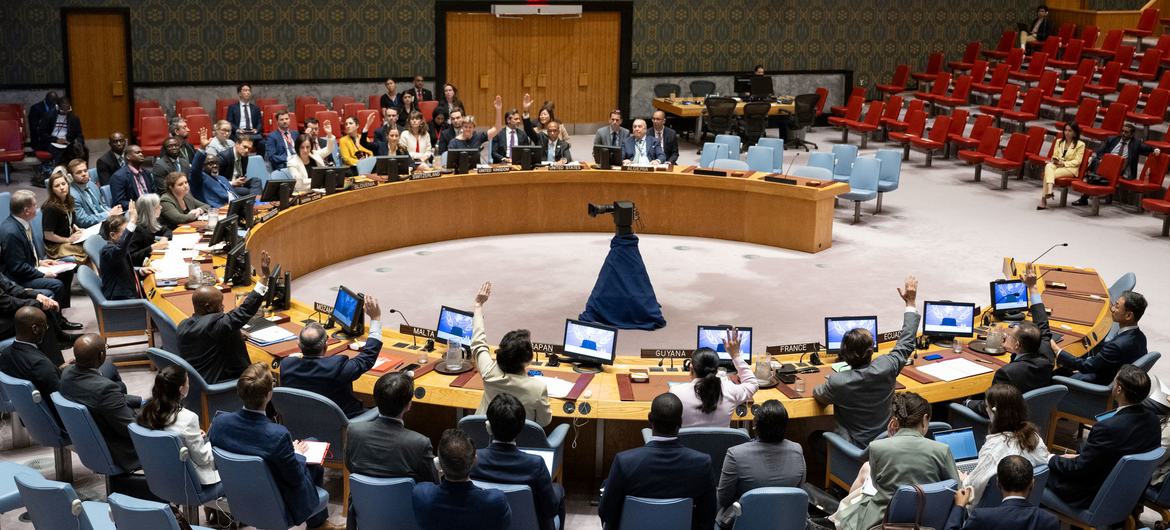Security Council Reiterates Demand to Halt Houthi Attacks

The United Nations Security Council has taken a firm stance against the ongoing attacks by the Houthis on merchant and commercial vessels in the Red Sea. One year after initially demanding an end to these assaults, the Council has adopted a new resolution, reaffirming its call for an immediate cessation of hostilities. The situation has escalated, with the Houthis employing increasingly sophisticated weaponry. This article delves into the details of the recent resolution, the implications for maritime security, and the diverse perspectives from member states.
Resolution 2768: A Renewed Call for Action
On [insert date], the Security Council adopted resolution 2768 (2025) with a vote of 12 in favor and three abstentions from Algeria, China, and the Russian Federation. This resolution extends the Secretary-General’s mandate to provide monthly reports on Houthi attacks until July 15, 2025. The Council reiterated its demand for the Houthis to cease all attacks and release the *Galaxy Leader* and its crew.
The resolution highlights the use of advanced weaponry in these assaults, prompting the Council to call on member states to halt arms supplies to the Houthis. The Council emphasized the importance of addressing the root causes of these attacks, which include regional conflicts and disruptions to maritime security. The representatives of various nations expressed concerns about the escalating situation, urging caution to prevent further deterioration in the Red Sea and surrounding areas.
The U.S. representative underscored the need for accurate reporting on the weapons supplied to the Houthis, particularly from Iran. She stated that attacks on vessels in the Red Sea are unacceptable and that legitimizing such actions would violate international law. The resolution aims to provide a framework for ongoing monitoring and accountability regarding the Houthis’ actions.
Maritime Security Under Threat
The representative from Greece highlighted the severe pressure on maritime security and freedom of navigation in the Red Sea. He noted that the ongoing attacks have significant implications for global shipping routes, leading to increased costs as vessels are rerouted to safer alternatives. The representative emphasized the need to investigate the origins of the advanced weaponry used by the Houthis and to uphold the arms embargo.
The situation poses a direct threat to international trade and the stability of the region. The Council’s resolution aims to protect maritime routes that are vital for global commerce. The representative from Panama echoed these sentiments, stressing that the attacks compromise the free transit of vessels, which is a fundamental principle of international law. He called for an immediate cessation of these assaults to restore security and stability in the Red Sea.
As tensions rise, the need for a unified response from the international community becomes increasingly urgent. The Council’s resolution serves as a critical step in addressing the ongoing threats to maritime security and ensuring the free flow of commerce in one of the world’s most crucial waterways.
Diverse Perspectives on the Resolution
The recent resolution has sparked a range of reactions from Security Council members. The Russian Federation’s representative expressed concerns about the “one-sided picture” presented in the resolution, suggesting that it overlooks the broader context of military actions by the United States and the United Kingdom in the region. He argued that the resolution fails to address the complexities of the situation, which includes the ongoing military campaign against Yemen.
Similarly, the Chinese representative pointed out that focusing solely on vessel attacks does not adequately address the underlying issues facing Yemen. He highlighted the connection between tensions in the Red Sea and the ongoing Gaza conflict, suggesting that a more comprehensive approach is necessary for a lasting resolution.
Algeria’s representative clarified that their abstention should not be interpreted as support for the Houthis’ actions. Instead, it reflects concerns about the implementation of previous resolutions and the potential misuse of the right to defend. This highlights the complexities and differing viewpoints among Council members regarding the best approach to address the crisis.
Despite these differences, many representatives agreed on the need for stronger language regarding the humanitarian impact of the Houthis’ attacks. The representative from Denmark noted that while the resolution sends a strong signal against arming the Houthis, it could have been more robust in addressing the humanitarian consequences of the ongoing conflict.
Looking Ahead: The Path to Stability
As the Security Council continues to monitor the situation in the Red Sea, the emphasis on addressing the root causes of conflict remains paramount. The representative from Somalia articulated the need for lasting solutions that tackle the underlying issues contributing to maritime insecurity. He expressed his country’s readiness to collaborate with other nations to ensure that the Red Sea remains a vital corridor for peace and prosperity.
The recent announcement of a ceasefire deal in Gaza has been viewed as a positive development, with representatives from various nations expressing hope for a broader peace process in the region. The representative from Sierra Leone emphasized the importance of a unified voice from the Security Council to protect maritime security and stability.
Observer Voice is the one stop site for National, International news, Sports, Editor’s Choice, Art/culture contents, Quotes and much more. We also cover historical contents. Historical contents includes World History, Indian History, and what happened today. The website also covers Entertainment across the India and World.

